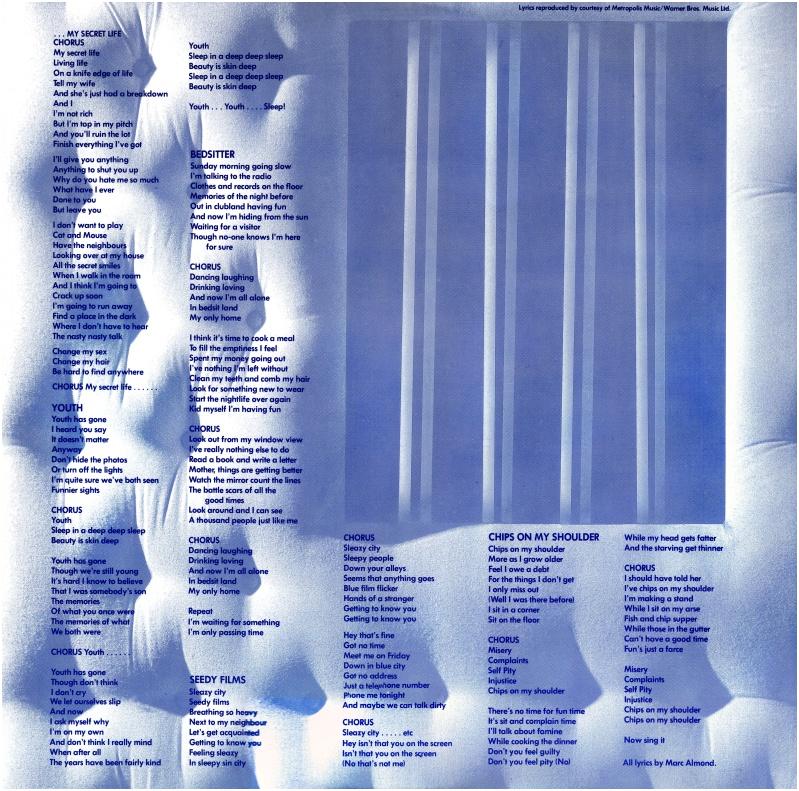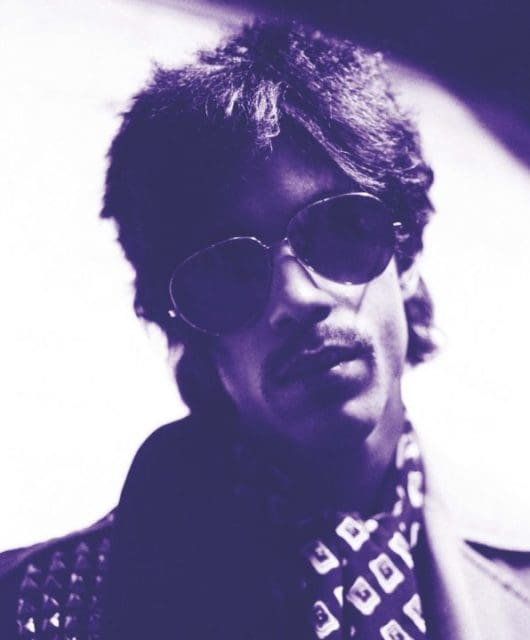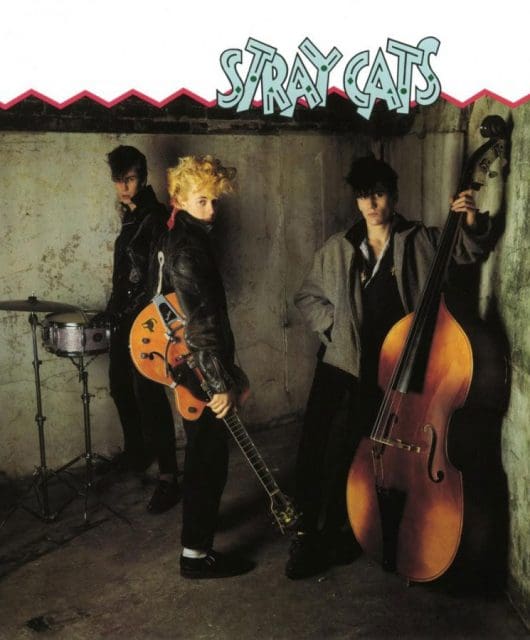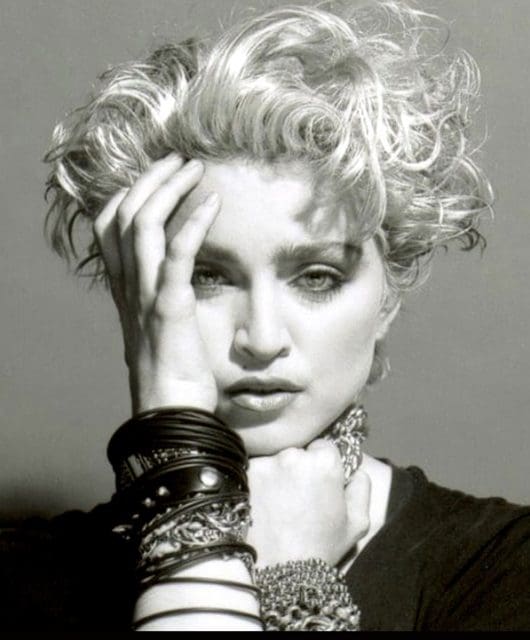Making Soft Cell’s Non-Stop Erotic Cabaret
By Mark Lindores | August 22, 2019
Thrust into the spotlight with their unique take on a soul classic, the Soft Cell debut album Non-Stop Erotic Cabaret delved deep into dive bars, seedy S&M clubs and porno cinemas, exposing Soho’s nocturnal activities in eye-watering detail…
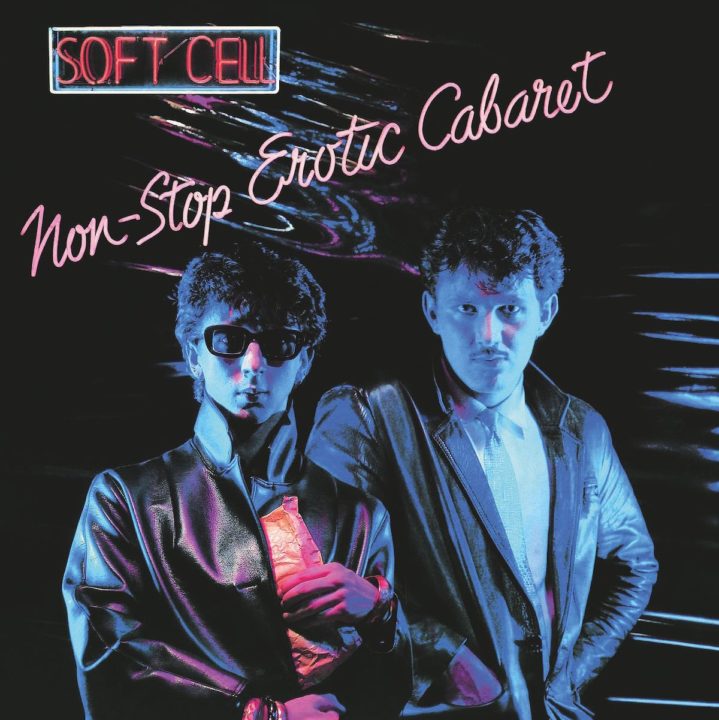
As Britain throbbed to the sounds of synth-pop at the dawning of the 80s, defined by the flamboyance of the New Romantics, the emergence of a pair of no-frills Northerners who had more in common with Sparks than Steve Strange injected the genre with a gritty realism.
Romanticising Soho’s murky underbelly, Soft Cell shared its neon-tinged spotlight with the hookers, hustlers and degenerates whose work usually nestled under sex-shop counters, discreetly distributed in brown paper bags.
“We were basically two young lads living in Leeds who suddenly found ourselves in Soho,” Dave Ball told Penny Black Music. “It was more like a curiosity thing – we weren’t actually participating in anything. We would go to places like the Naked City Cinema just to get the vibe of it. We were like sex tourists, but without doing the sex! We were kind of like: ‘Wow! This is really exciting. What’s going on here?’ We just loved the imagery and the sleaziness. It was more an artistic thing than a sexual thing.”
Dave and Marc Almond had met in 1977 while both students at Leeds Polytechnic: Dave was enrolling, Marc was a second-year Fine Art student. He was also a well-known face on Leeds’ performance-art scene, thanks to onstage antics that included stripping naked in front of a full-length mirror and smearing himself with cat food.
After overhearing Dave’s work while he was putting a show together, Marc asked if he could use some of the music in the show.
“He used to go past and hear these weird electronic noises that I was messing around with, and one day he came in and asked me if he could use my music when he was doing some of his performance work,” Dave recalls.
“That was our next meeting, and how we originally got together. My idea of pop music was very bleepy, minimal songs about Tupperware parties and very mundane things. I was into that whole reality thing of the time, and Marc heard some and said: ‘Can I sing some of them?’ and I said: ‘Yeah. Why not? You’ve got a better voice than me.’ That’s how Soft Cell came about.”
With a wealth of ideas between them, Marc and Dave began writing prolifically, soon establishing roles within the band to adhere to. “Marc was like a lyric machine as well as a great singer and from those early beginnings, it developed,” Dave says.
“He was a much better lyricist than I was and eventually, I said: ‘Why don’t you write all the words?’ and that took it to a new level. We both just worked constantly, that was all I did, all day. I would get up in the morning, switch on my tape recorder, start my synthesiser and I would write five or six tunes a day, even just rough ideas, like melodies or basslines or whatever.”
“It worked, because we shared a similar taste in music and art and a sick, twisted view of the world!” Marc told The Independent. “We wrote about the darker side of society and the darker side of emotions, and explored underworlds and went to other places. But I don’t think there was anything new about that.
“We were following in a tradition of bizarre music-hall songs, or French chanson where they sang about life in the gutter and the prostitutes on the street… it’s about real life, and there’s something very passionate and something very seductive about it.”
Having amassed almost 200 songs, the band’s first steps to success came courtesy of their gigs. Mixing the live music experience with Marc’s performance-art background gave them a unique standpoint and, with music and a look that reached out to anyone who had ever felt like a misfit or an outsider, Soft Cell built up a strong following.
Recognising this, they began sending demos to record labels and, after not receiving any response, took matters into their own hands by borrowing money from Dave’s mum to self-finance a release of a four-track EP on their own Big Frock Records label. Entitled Mutant Moments, Soft Cell pressed 2,000 copies, one of which found its way to Stevo Pearce, a 17-year-old DJ and columnist for Sounds, in which he featured demos of unsigned electronic acts.
After hitchhiking to Leeds to see Soft Cell live, Stevo, impressed by their show, offered them an opportunity to have a track featured on a compilation album he was putting together for the Some Bizzarre label as well his services as their manager.
They contributed The Girl With The Patent Leather Face to the Some Bizzarre Album (which also featured Depeche Mode, The The and Blancmange) and landed a deal with the label, which was backed by Phonogram Records. After Soft Cell’s single Memorabilia failed to chart, Phonogram were poised to drop Soft Cell, until Stevo persuaded them to give them one more chance. Despite having hundreds of self-penned tracks to choose from, it was decided that a cover would be the best option to gain some momentum for the band.
Having performed Frankie Valli’s The Night during their live shows, that was the pair’s original choice to go with. But after hearing Gloria Jones’ Tainted Love in The Warehouse, the Leeds club in which he worked as a cloakroom attendant, and discovering Jones’ connection to his idol Marc Bolan, Almond took the idea of covering it to Dave, a Northern Soul aficionado who knew the song well.
“I’d been collecting Northern Soul since 1975 and going to clubs like Wigan Casino and the Highland Room at the Blackpool Mecca,” Dave says. “It was the same time that Kraftwerk released Autobahn. So I was really into Northern Soul and then suddenly, I heard this electronic sound, and it was like ‘boom!’ – something huge went off in my head.”
Soft Cell’s minimalist take on the soul classic was a runaway smash, topping the charts in September 1981, hanging about the upper echelons of the chart for the remainder of the year. It was the biggest-selling single of the year, far exceeding everyone’s expectations and catapulting the band to pop infamy.
After their first Top Of The Pops appearance, Dave and Marc’s lives changed literally overnight; particularly the latter, whose kohl-rimmed eyes leering down the camera and leather-cuffed arms flailing wildly sent shockwaves throughout Britain. “I wanted our first Top Of The Pops appearance to have an impact the way Bowie’s had,” he later said.
No sooner had Soft Cell made it big, Marc discovered the glamour and fame of being a pop star was a veneer behind which hid a myriad of problems – and being instantly recognisable came with many pitfalls. An openly gay man, Marc was subjected to vile homophobia in the press and in the street.
“I became the magnet for a lot of scary aggression,” he later told The Guardian. “Soft Cell stirred up a lot of old prejudices and grudges. People found us really threatening. When people talk about gender-benders and bracket me with [Boy] George, I always think I wasn’t like that. I had more of a rock edge, mixed with 80s electro.
“We were gothy, we loved the New York thing and people like Suicide; Dave loved Throbbing Gristle, we both loved the Sheffield bands and Down In The Park by Gary Numan/Tubeway Army – we loved the darkness to that kind of electro. And when we chose our cover versions, we chose a gritty old soul number, or Born To Lose by Johnny Thunders. But there was a lot of hate directed towards us. I still lived in Leeds at the time, and it became very frightening to live there.”
A respite from the vitriol directed at them came with the band dispatched to New York to finish work on their debut album with producer Mike Thorne. “We put the album together in six weeks,” Dave says. “We had 200 songs and whittled it down to what we felt were the best. That was how it evolved, really. We had a really good backlog of stuff that we wanted to get out. Some of the stuff was written at the time, but other songs dated as far back as when we were at college.”
‘We tried to shine a spotlight into what was really going on in Margaret Thatcher’s Britain’
As well as completing their album, Soft Cell’s trip to New York was revelatory in terms of recreational activities, particularly their introduction to party drug MDMA as they threw themselves into the city’s then-thriving club scene. It was a liberating, thrilling experience which would signal the beginning of their downfall.
Released on 27 November 1981, Non-Stop Erotic Cabaret was met with mixed reviews, having fared much better in hindsight. Peaking at No.5, the album produced two further hits in Bedsitter and Say Hello, Wave Goodbye as well as a remix album (Non-Stop Ecstatic Dancing) and a longform video album (Non-Stop Exotic Video Show). US success also followed with Tainted Love reaching No.8 and spending an unprecedented 43 weeks in the chart (their only hit there).
Almost four decades on, Non-Stop Erotic Cabaret is regarded as a classic work, not only musically, but also culturally. “I’m really proud of it – I think it’s a great record,” Marc says. “But it came out of a tough time. We always thought we were anti-establishment, and we tried to be a bit of an antidote to what was going on at the time.
“We tried to shine a spotlight into what was really going on in Margaret Thatcher’s Britain, the underlying darkness behind it all. When we wrote about Soho and the rest of it, it was really a representation of a microcosm of Thatcher’s Britain. It wasn’t really just about Soho, it was a metaphor.”
“Some of the music at the time was very conservative. We tried to be an antidote to what was being presented as the clean, wholesome side to Conservative Britain. We weren’t political in the sense of waving banners and doing Rock Against Racism and all of that, but we tried to be a little bit more subversive, purely by being what we were.
“Us getting a record on the radio felt like a triumph in itself, because I was what I was, and Dave was this psychotic person behind the keyboards. A lot of 80s pop was very glossy and well-produced, all with super tans and super good-looking, and we wanted to have a bit of a dirty air, the dirt under the carpet. We saw ourselves as portraying the Britain that was crumbling under the facade.”
 Soft Cell: Non-Stop Erotic Cabaret – The Songs
Soft Cell: Non-Stop Erotic Cabaret – The Songs
1 Frustration
The perfect opener to Soft Cell’s debut, Frustration is a re-recorded version of an early track which had been featured on Mutant Moments, an independently financed EP which they had released on the Big Frock Records label in 1980. A focal point of their outré live sets, which established the Soft Cell branding of fusing performance art, sex and synths suffused with a sinister undertone, the urgency of Marc Almond’s vocal is a perfect match for Dave Ball’s pulsating beats.
2 Tainted Love
A make-or-break opportunity for the duo, Tainted Love was released after debut single Memorabilia had flopped and the record company gave them one final chance to score a hit, or they’d be dropped. Both fans of Gloria Jones’ Northern Soul classic, Marc and Dave slowed down the song’s tempo, lowered the key and, recording it with its signature sparse synths, made it entirely their own. Tainted Love reached No.1 and shifted 1.3 million copies, becoming the biggest-selling single of 1981. Despite its success, the duo earned practically nothing from Tainted Love as they included another cover on its B-side, The Supremes’ Where Did Our Love Go, denying themselves a lucrative payout of royalties from the single. Almost four decades on, Tainted Love is their most enduring track having been covered countless times by all kinds of artists, including Marilyn Manson and Pussycat Dolls, as well as being sampled extensively by Rihanna on her hit SOS.
3 Seedy Films
A hypnotic, almost ambient beat soundtracks the first of many songs on the album to celebrate the sordid subculture of Soho and its status as a hub for outcasts and deviants keen to indulge in the illicit and perverse, revelling in picking up in dive bars and porno cinemas. Languidly delivering lyrics about the “Sleazy city, seedy films, breathing heavy next to my neighbour”, while “blue films flicker while hands of a stranger get to know you”, the city’s sex trade could not be depicted more literally, as sex tourist Almond trawls Soho in search of company. Musically, that arrives in the form of a verse from Soft Cell backing vocalist Cindy Ecstasy and a trumpet solo from celebrated jazz musician John Gatchell over a groove that evokes Donna Summer’s seminal Love To Love You Baby.
4 Youth
Amidst the sex and squalor that Non-Stop Erotic Cabaret has become renowned for are moments of incredible maturity that far belie the-then mid-20s Almond. The first of these is Youth, a poignant, at times heart-breaking ode to the passing of time, boasting reflective and regret-filled lyrics such as: “The memories of what you once were… Youth is skin deep”. Musically, Youth’s haunting lyric is replicated by a sinister-sounding, heavily echoed drumbeat, with a short keyboard line following the bitter chorus.
5 Sex Dwarf
Even without the perverse video for which Sex Dwarf has become infamous, the song itself is a benchmark of depraved pop, with the lyrics themselves conjuring up a series of arresting subversive images as Almond recounts his list of list of erotic delights with hilariously creepy delivery, about “luring disco dollies to a life of vice” and wanting the object of his desires “…on a long black lead/ I will parade you down the high street” over a pulsating beat which bristles with the cracking of a whip, camera clicks and anonymous panting and moans. Superbly produced by Mike Thorne, sonically Sex Dwarf could be the twisted cousin of Depeche Mode’s Photographic.
‘We put the album together in six weeks. We had 200 songs and whittled it down to what we felt were the best.’
6 Entertain Me
An obvious nod to Almond’s performance-art background, Entertain Me opens with an a cappella opening verse which finds him in fine voice, before he is joined by Ball’s pulsing electronica interspersed with theatrical, almost vaudevillian catcalls from a crowd of “Build ‘em up! Knock ‘em down!” and “Off! Off! Off!” lending the track an authentic nod to a London of yesteryear.
7 Chips On My Shoulder
Having hit their stride on the preceding track, Chips On My Shoulder is, sonically speaking, very much a continuation of that song – with the Hi-NRG beats and squelching synths punctuated with a crowd of taunts, shouts, whoops and whistles, culminating in an apparent celebration of petulance as Almond rejoices in a chorus of “Misery, complaints, self pity, injustice!”
8 Bedsitter
One of the finest depictions of the alienation of urban life, Bedsitter is a raw, often visceral account of Almond’s move from the suburbs to the big city. Set adrift from family and without friends, his only form of human contact coming from chance encounters enjoyed while indulging in the city’s bustling nightlife: he juxtaposes the highs of a night on the town against the empty, devastating comedown of the morning after the night before. Released as the follow-up to Tainted Love, Bedsitter reached No.4 in December 1981, the first Almond/Ball-penned track to crack the charts.
9 Secret Life
One of the highlights of the album, Secret Life is a jaunty, Northern Soul-inspired track which deals with the hypocrisy of a married man begging his partner to keep his secret before disclosing it to his wife himself, causing her to have “a nervous breakdown”. With mentions of the partner being in possession of a little black book with the “names of people in the headlines”, the song evokes politicians such as John Profumo and Jeremy Thorpe and their sex scandals, with Almond taking on the role of soon-to-be-disgraced adulterer with relish.
10 Say Hello, Wave Goodbye
Soft Cell’s finest moment, Say Hello, Wave Goodbye is a sweeping slice of melancholia depicting the gut-wrenching breakdown of a significant relationship. Released as the third and final single from the album, Say Hello, Wave Goodbye reached No.3 in the UK and revealed a different side of Soft Cell to those who had previously been dismissive of them. A superb example of storytelling, its lyrics immediately conjure up striking imagery, particularly the opening line of standing outside the Pink Flamingo in the rain, desolate and desperate. “That was Brewer Street in the rain,” Marc later said, “outside the pink Piano bar where the drag artists used to sing, with the neon light from the Raymond Revuebar reflected on the wet streets. It was what Non-Stop Erotic Cabaret was about, what Soft Cell was about, what I was about.”


